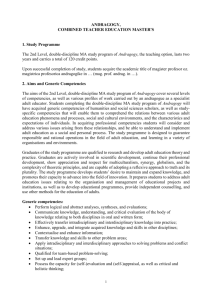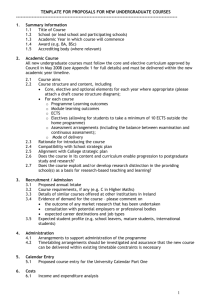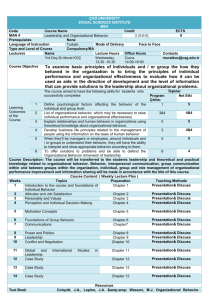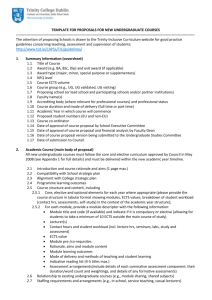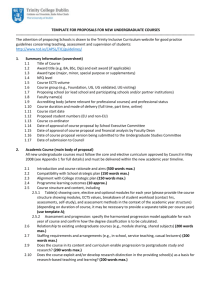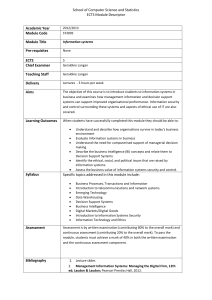andragogy, teacher education master's
advertisement
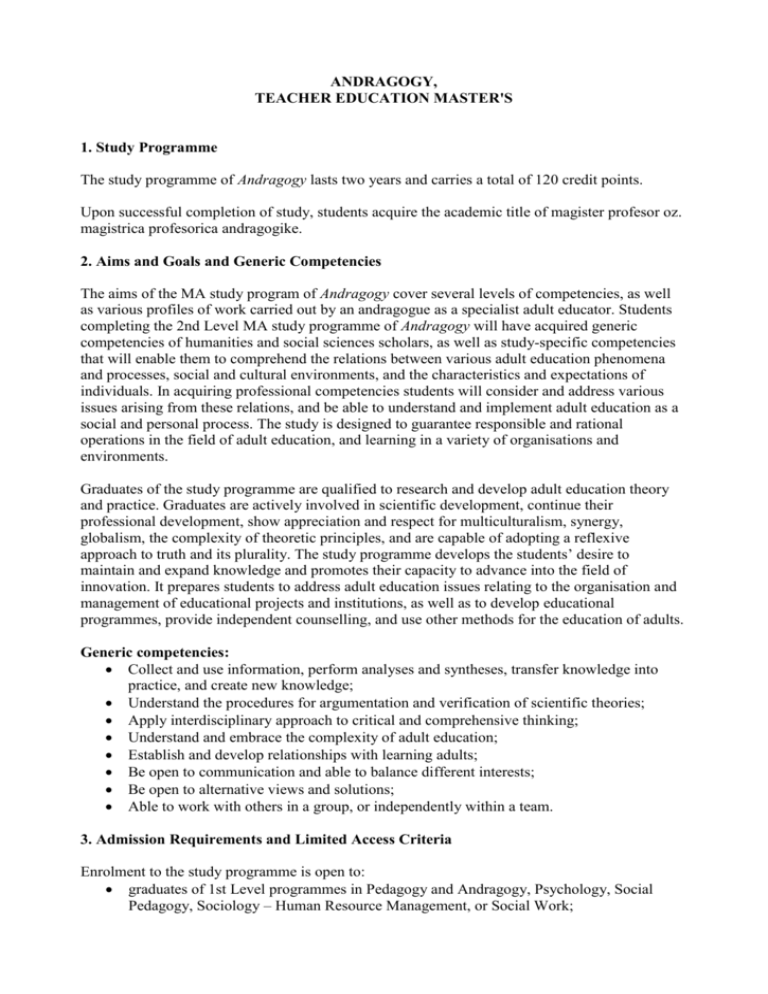
ANDRAGOGY, TEACHER EDUCATION MASTER'S 1. Study Programme The study programme of Andragogy lasts two years and carries a total of 120 credit points. Upon successful completion of study, students acquire the academic title of magister profesor oz. magistrica profesorica andragogike. 2. Aims and Goals and Generic Competencies The aims of the MA study program of Andragogy cover several levels of competencies, as well as various profiles of work carried out by an andragogue as a specialist adult educator. Students completing the 2nd Level MA study programme of Andragogy will have acquired generic competencies of humanities and social sciences scholars, as well as study-specific competencies that will enable them to comprehend the relations between various adult education phenomena and processes, social and cultural environments, and the characteristics and expectations of individuals. In acquiring professional competencies students will consider and address various issues arising from these relations, and be able to understand and implement adult education as a social and personal process. The study is designed to guarantee responsible and rational operations in the field of adult education, and learning in a variety of organisations and environments. Graduates of the study programme are qualified to research and develop adult education theory and practice. Graduates are actively involved in scientific development, continue their professional development, show appreciation and respect for multiculturalism, synergy, globalism, the complexity of theoretic principles, and are capable of adopting a reflexive approach to truth and its plurality. The study programme develops the students’ desire to maintain and expand knowledge and promotes their capacity to advance into the field of innovation. It prepares students to address adult education issues relating to the organisation and management of educational projects and institutions, as well as to develop educational programmes, provide independent counselling, and use other methods for the education of adults. Generic competencies: Collect and use information, perform analyses and syntheses, transfer knowledge into practice, and create new knowledge; Understand the procedures for argumentation and verification of scientific theories; Apply interdisciplinary approach to critical and comprehensive thinking; Understand and embrace the complexity of adult education; Establish and develop relationships with learning adults; Be open to communication and able to balance different interests; Be open to alternative views and solutions; Able to work with others in a group, or independently within a team. 3. Admission Requirements and Limited Access Criteria Enrolment to the study programme is open to: graduates of 1st Level programmes in Pedagogy and Andragogy, Psychology, Social Pedagogy, Sociology – Human Resource Management, or Social Work; graduates of 1st Level programmes, or those who have completed a higher professional degree in a study program adopted prior to 2004, in social sciences, humanities or preschool teaching, provided they have completed academic requirements equivalent to 15 ECTS credits in the following subjects: Introduction to Adult Education (5 ECTS), History of Education (5 ECTS), and Educational Psychology I (5 ECTS); graduates of 1st Level programmes, or those who have completed a higher professional degree in a study program approved before 2004 in unrelated areas of study, provided they have completed academic requirements equivalent to 40 ECTS credits in the following subjects: Introduction to Adult Education (5 ECTS), Educational Statistics (5 ECTS), Educational Psychology I (5 ECTS), History of Education (5 ECTS), Didactics I (5 ECTS), Vocational Pedagogy and Andragogy (5 ECTS), Comparative Adult Education I (5 ECTS), and Counselling and Guidance in Adult Education (5 ECTS). In cases of limited access, candidates will be ranked based on their undergraduate Grade Point Average. 4. Criteria for Recognition of Prior Learning (RPL) The Faculty of Arts may recognize qualifying knowledge, qualifications, and/or competencies the content and level of which meet, in full or in part, the general or subject-specific competencies of the relevant study programme. In the RPL process, the Faculty: considers certificates and other documents, assesses the products, services, publications, and other copyright works of student candidates. The recognised knowledge, qualification, or competence may be considered a prerequisite of gaining entry into a study programme (if so permitted by the rules of the relevant study programme), of gaining entry into a limited access programme, or leading to the award of credit to count towards the programme’s requirements. Knowledge, qualification, or competence recognised as completed academic requirement must be evaluated under ECTS criteria. On the basis of recognition criteria, all RPL applications supported by documents are assessed by the Faculty of Arts in a standardised procedure, as laid down in the Statute of the University of Ljubljana and the Rules of the Faculty of Arts. 5. Progression Requirements Progression requirements To meet the requirements for promotion to a higher year of the study programme of Andragogy, students must obtain a minimum of 90% of the ECTS credits (54 out of 60 credits) from the courses prescribed by the curriculum for the first year. Under exceptional circumstances, as defined in Article 153 of the Statute of the University of Ljubljana, students who have completed 85% of coursework (i.e. they have obtained 51 credit points) may advance to the higher year on the basis of an approved application. This application is processed by the Committee for Students’ Questions and Direction, and the Department can give an advisory opinion. Students have to obtain the missing credits before advancing to the subsequent year. In accordance with Article 152 of the Statute of the University of Ljubljana, students who have failed to complete the coursework required for progression to the subsequent year have the right to repeat one year in the course of their study provided they have earned 15 ECTS credits (25% of the year’s total) from completed courses prescribed for the study programme. The conditions for extending student status are specified in Article 238 of the Statute of the University of Ljubljana, and the conditions for reposing student status are given in Article 240 of the same. 6. Programme Completion In order to complete the programme, students must complete all requirements defined by the programme and for syllabi required for their chosen option totalling 120 ECTS credits. The programme is completed with a successful oral defence of a positively evaluated master’s thesis. 7. Transferring between Study Programmes Transfers are only possible among other study programmes of the 2nd Level. Students may transfer among study programmes: - which ensure acquisition of comparable competencies upon completion of the study; - where, according to the RPL criteria, at least half of the required coursework completed in the original study programme may be recognised under the ECTS as relating to compulsory coursework requirement of the second study programme. A student may enrol in the higher year of the new study programme if during the recognition procedure s/he has been awarded sufficient number and type of ECTS credits that are prerequisite for progression to a higher year of a valid study programme. Enrolment in the first year of study is not considered transfer of a study programme. The following may be recognised during study transfers: - comparable courses which the students has completed in the original study programme; - comparable knowledge and experiences obtained through informal learning. Qualifying documents must be submitted as evidence of prior learning. In accordance with Article 5 of the Criteria for Transitions between Study Programmes, students may also change from university (non-Bologna) study programmes approved before 11 June 2004 to the Bologna study programmes. Changing the programme is possible: - within the framework of study programmes of the same discipline, and - if not more than two years have passed from the candidate’s last enrolment in the university study programme which s/he is changing, but no later than by the end of the 2015/16 academic year. On the basis of the candidate’s application and evidence of completed coursework requirements, the Faculty’s competent body, following the department’s proposal, determines whether or not the candidate fulfils the criteria for changing the programme and whether these obligations can be recognized following the procedure determined by the Statute of the University of Ljubljana. If the student has fulfilled obligations at a higher education institution abroad, s/he can submit an application for the recognition of education abroad. The application must be submitted on a prescribed form in accordance with the Evaluation and Recognition of Education Act and valid rules and regulations. The application should be accompanied by the prescribed documents. 8. Assessment Methods Students’ attainment is assessed and evaluated by individual subject. In all subjects, the learning process must end with an assessment of learning outcomes. Examination methods are defined in the syllabus of individual courses. General rules governing knowledge assessment and evaluation are laid down in the Rules on the Examination Regime of the Faculty of Arts, University of Ljubljana. The grading scale used is in accordance with the Statute of the University of Ljubljana. 9. Curriculum First year First semester N o. Study unit Comparative Adult 1 Education II+ Selected Methods of Adult Education 3 Program Planning in 4 Adult Education 5 External Elective 1 6 Practicum (in Adult Education) Contact Hours Clin ical prac Course Le Se Pra ticu Coordinator ct. m. ct. m Dr. Sonja Kump, 30 60 / / Full Professor Dr. Marko 30 30 Radovan, 15 / Assistant Professor Dr. Nives 30 30 Ličen, Assistant 15 / Professor 30 30 / / Dr. Monika Govekar Okoliš, / / 30 / Assistant Professor Oth er for ms Indi vidu al wor k / 120 Tot al hou EC rs TS 210 7 180 6 / 105 / 105 / 90 / 150 180 6 TOTAL WEIGHT 150 5 180 6 900 30 Elective Courses N External Elective 1 o. Theory of Organisation and Management Course Coordinator Contact Hours Clin ical Le Se Pra prac ct. m. ct. ticu m Dr. Janko Muršak, Full Professor 30 30 / / Oth er for ms Indi vidu al wor k Tot al EC hou TS rs / 90 150 5 Selected Topics in Sociology of Adult Education Dr. Sonja Kump, 30 30 Full Professor / / / 90 150 5 Oth er for ms Indi vidu al wor k Tot al hou EC rs TS First year Second semester Contact Hours Clini cal Le Se Pra pract ct. m. ct. icum N o. Study unit History of Adult Education in 2 Slovenia Course Coordinator Dr. Monika Govekar Okoliš, 60 / / / / 90 150 5 Assistant Professor Didactic Strategies Dr. Jana Kalin, 3 Associate 60 / / / / 90 150 5 Professor Psychology of Dr. Barbara Šteh, 4 Learning and Adult Associate 30 30 / / / 90 150 5 Education Professor Selected Research Dr. Jasna 5 Methods Mažgon, Assistant 15 30 15 / / 90 150 5 Professor 6 External Elective 2 * * / / / 90 150 5 7 General Elective * * * * * 150 5 TOTAL 900 30 WEIGHT * The breakdown of contact hours for electives by type of study is considered in the Total. Elective Courses Contact Hours External Elective 2 Human Resource Development Planning Socio-cultural Animation and Education for Community Development TOTAL Indi vidu al wor k Course Coordinator Tot al EC hou TS rs Dr. Vida 45 15 Mohorčič Špolar, Assistant Professor / / / 90 5 Dr. Marko Radovan, Assistant Professor / / / 90 150 5 30 30 150 Second year First semester N o. Study unit 1 Research Seminar + in Adult Education Course Coordinator Dr. Sabina Jelenc Krašovec, Associate Professor 2 External Elective 3 3 External Elective 4 4 General Elective TOTAL WEIGHT Contact Hours Clin ical prac Lec Se Pra ticu t. m. ct. m Oth er for ms Indi vidu al wor k 30 15 / / / 105 150 * 30 * * 30 * / / * / / * / / * 90 150 5 150 5 450 15 Oth er for ms Indi vidu al wor k Tot al EC hou TS rs Tot al E hou C rs TS 5 Elective Courses N o. External Elective 3 Professional Adult Education Family Life Education Course Coordinator Dr. Janko Muršak, Full Professor Dr. Nives Ličen, Assistant Professor Contact Hours Clin ical Le Se Pra prac ct. m. ct. ticu m 30 30 / / / 90 150 5 30 30 / / 90 150 5 TOTAL Elective Courses N o. Course External Elective 4 Coordinator E-learning Contact Hours Clin ical Le Se Pra prac ct. m. ct. ticu m Dr. Marko Radovan, 30 30 Assistant Professor Dr. Klara Ermenc Skubic, Associate 30 30 Professor / / Indi Oth vidu er al for wor ms k Tot al EC hou TS rs / 150 5 90 European Educational / / / 90 150 5 Strategies TOTAL * The breakdown of contact hours for elective courses by form is considered in the Total. + The subject marked 1 is a two-semester subject, which is why its number appears again in the second semester. Second year Second semester N o. Study unit Research Seminar 1 in Adult Education + 2 Master’s thesis TOTAL WEIGHT Course Coordinator Dr. Sabina Jelenc Krašovec, Associate Professor Contact Hours Clini cal Le Se Pra pract ct. m. ct. icum / 45 / / Oth er for ms Indi vidu al wor k 15 / / / / / / Tot al hou EC rs TS 60 2 840 28 10. Course Description Comparative Adult Education II The course provides in-depth and extensive study of comparative research in adult education, and an analysis of conceptual developments and adult education practices in the varied social, economic, political, and cultural environments in different countries and regions of the world. Human Resource Development Planning The course deals with the development of human resources from the earliest human resource policies to the current human resource development models. Students will examine the role of human resource management in a company, explore the dilemmas of human resource development and planning at the national and corporate levels, and consider the beneficiaries (individuals, the society) of the process. At a more applicative level, the course will provide an in-depth study of human resources (induction training, education, training, career development, selection of education and training programs, information system and databases, employee education monitoring) and outlines the legislative and other groundwork of this field. Selected Methods of Adult Education Participants in the course will explore the theoretical background as well as different classifications of experiential learning. They will develop a detailed understanding of specific target groups, plan in-depth interviews for specific target groups, and analyse these interviews using the project method. The course will also deal with the assessment and validation of experiential learning, as well as with the preparation and evaluation of a prior learning portfolio. Socio-cultural Animation and Education for Community Development Participants in the course will learn to recognize contemporary social phenomena and study the methods and techniques to adapt to these phenomena through education and community involvement. Knowledge can be applied to all situations where innovation is required by the community (company, local community, organisations, societies, etc.). The course will also present successful European projects which promote employment and better life in society. Program Planning in Adult Education The purpose of this course is to provide an overview of theoretical models and environmental factors which affect the planning of programmes for adults, in particular as regards informal education and training. Students will be able to use a range of instruments in order to determine the educational needs of individuals and groups within an organisation, company or local environment, as well as to design functional programs and evaluate their effectiveness. History of Adult Education in Slovenia In the History of Adult Education, students learn about the principles behind the fundamental theories of education of adults and the functioning of the educational process when serving adults in various historical periods in Slovenia. Students explore the role of formal and informal education of adults. They understand the role of teachers in the history of adult education in Slovenia, the principles of developing various forms and methods of adult education, and the role of continuous development and lifelong learning of adults. Didactic Strategies In this course, students will get to know various didactic strategies required in modern teaching. Their qualifications will include the use of project work, problem-based learning, cooperative learning, and pupils’ research work. They will learn about the process of planning and introducing didactic innovations, and develop their ability to use critical thinking to select appropriate methods and didactic strategies for set goals. Psychology of Learning and Adult Education The course content is chosen from the following themes: developing communication skills in connection with experiential learning; structure and dynamics of learning groups, leadership styles, learning in groups, cooperative learning; affective factors of learning; models of development of learning strategies; psychology of creativity; psychological principles of moral development; psychological aspects of (self) evaluation, and assessment of learning results. In the chosen topics students learn to address psychological aspects of adult education with criticism and depth. They develop the competence of planning and executing seminars and workshops for different target groups. Selected Research Methods Students will expand their knowledge of general components of educational research methodology and fundamental methods for studying various educational phenomena. They will explore the basic characteristics of qualitative research, types of qualitative research, and the level of qualitative research knowledge. Together with other methodological courses, this course qualifies students for all types of empirical research in the field of adult education, for understanding more complex research methodology, and for critical use of their findings. Theory of Organization and Management Participants in the course develop basic competencies required for efficient organisation and management of non-profit organisations, in particular those dedicated to education and training. Students learn contemporary organisation theories and their application in current conditions. Emphasis is placed on studying the role of professional bodies in educational organisations for young people and adults. Selected Topics in Sociology of Adult Education The course deals with contemporary theoretic principles in sociology of adult education (e.g. feminist theories, constructivism, transformative learning, and reproduction theory) and recent research approaches used in sociology of education (action research, biographic methods, determination of social origin). Research Seminar in Adult Education Students engage in empirical research of selected theoretic concepts, analysing the selected phenomena in the field and studying their occurrence in different time periods, as well as social, economic, and political circumstances. Students carry out a small-scale empirical research project that includes the use of various research methods. Vocational Andragogy Participants in the course will learn about the operation of educational organisations serving adults, in particular those parts of these organisations which include or perform education and training for the needs of work. They will be trained to organise and manage educational activities within companies and other organisations. Students will develop the knowledge and skills necessary to set up an educational organisation and obtain the competencies to run it. They will be able to analyse the relationships between work and adult education and prepare short training programmes. Family Life Education The focus of the course is on studying family life learning and family life education. Students analyse and explore family practices in various stages of life or history in relation to biographical learning, based on specific transformational and experiential learning theories. Students develop their competence for critical reflection on learning as part of everyday life, and learn to plan and organise educational programmes for family life education. E-learning Participants in the course will learn and understand the theoretical groundwork of e-learning and the advantages offered by the changing and increasingly accessible modern technology. They will distinguish several forms of e-learning based on their developmental typology, degree of formalisation, education level, and target group. Students will gain in-depth knowledge of the planning and organisation of e-learning, e.g. informal education of adults. Practicum Students are given all the instructions and support in selecting and establishing contacts with the organisation where they will carry out adult education practicum. Students will have an in-take interview with the selected service provider, and will be awarded a mentor with whom they will draw up a practicum plan. The practicum is pursued under the mentorship of a university professor and a site supervisor working for the partner school or institution where the studied adult learning programme is carried out. Upon completing the Practicum, the student is obliged to draw up a Practicum Report, which is reviewed and evaluated by the site supervisor, and present it in the form of a seminar to other students at the Faculty. European Educational Strategies Students will explore European systems, with an emphasis placed on the system as an inherent whole and on the way these systems are affected by national and transnational events and traditions. They will study European educational systems (the Københaven and Bologna processes, European and National Qualifications Framework), and analyse the effects of the global benchmarking of learning outcomes on the educational strategy.
